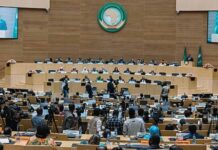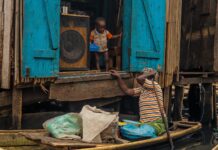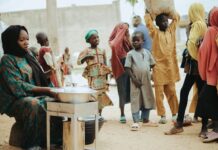This year, following the Trump administration’s decisions to significantly reduce the amount of foreign assistance given out by the United States around the world, there has been a lot of discussion and debate about foreign aid around Africa online. In the online world, rather than these sudden cuts to foreign aid being viewed as cause for distress, instead the cuts to foreign aid have been met with praise. Particularly on social media, foreign aid has been demonized as a form of Western imperialism over Africa and has even been criticised as making Africa poor.
Now, it is true that there are numerous valid criticisms that can be made of the way that foreign assistance has been handed out across Africa. For example, one valid criticism is when questions are raised about the large salaries that workers of certain NGOs pay themselves with money donated to assistance programs. Or the allegations that have waged against an organisation like USAID, which has been accused of interfering in the politics of other nations to advance the interests of the US government rather than only existing to deliver aid to vulnerable populations.
Absolutely, there are valid critiques that can be made. There are undoubtedly going to be many ways in which these sorts of systems can work better. However, the idea spread by many, particularly online, that foreign aid has been a net negative to the African continent is just false. It is not a coincidence that the people least dependent on the foreign assistance are the ones who are the first to proclaim that it is not a necessity. The fact that they are able to even use social media to bash foreign aid already speaks to their positions of immense privilege in our societies.
Our poorest people often do not even have access to the internet to go on social media to engage in discussions online about whether or not foreign aid is a necessity. These are the truly vulnerable populations whose voices are rarely (if ever) actually heard from in these discussions about foreign aid. However, I am sure that we can conclude that such communities that actually depend on foreign aid would likely argue in favour of these programs existing. As these are typically one of the few ways in which they are able to feed themselves and their families.
A common argument that is regularly brought up in these discussions is that African countries receiving aid creates a culture of dependence around the continent. Rather than investments being made to improve the economies of African countries, communities become dependent on handouts from aid organisations, stifling our development. However, this is just another scapegoat avoiding the main problem that has plagued Africa all these years, which has nothing to do with a dependence on foreign aid but rather the corruption that has stifled our economic growth.
It is extremely unproductive to admonish international aid organisations that come to Africa to aid our most vulnerable populations, rather than addressing the systems that cause there to be people dependent on this assistance in the first place. Africa is not poor because we have become dependent on foreign aid; our countries are dependent on foreign aid because our people are poor. And the reason for that poverty is not accidental; it is the direct result of corrupt, self-serving governments whose policies and actions have consistently undermined genuine development.
This poverty is not created by a lack of ambition or ability. If given the chance, most Africans would be prepared to work to grow our economies. However, without access to even the most basic infrastructure needed to do business, then this is not a possibility for most. How can businesses thrive when electricity is unreliable, water is scarce, and food security is fragile? These are the foundations of any functioning economy, however decades of corruption have drained resources away from such vital investments, leaving our people to pay the price.
If a lack of investment was not enough, the stifling bureaucracy that African politicians impose on businesses trying to operate in our countries is another major obstacle to our economic development. When endless red tape becomes the norm, and bribing officials is the only real way to navigate that system, most businesses would rather opt out entirely from investing in our countries. It is just a reality that doing business in African countries often becomes a hassle due to such bureaucracy, leaving our nations starved of the growth and jobs they could have created.
Even for private businesses that manage to survive Africa’s bureaucratic hurdles, the challenges do not end there. Our governments create new obstacles, targeting companies with punitive fines or arbitrary demands. In Nigeria, for example, Meta threatened to withdraw Facebook after the government pursued $290 million in fines. In Ghana, officials have pressured MultiChoice to slash DSTV subscription prices under the threat of shutting down its operations. When governments begin dictating how private companies set their prices or operate, they only serve to scare away investors.
When ranked globally by the World Bank Group on ease of doing business, most sub-Saharan African nations fell outside the top 100 countries. In fact, only 7 sub-Saharan African countries Mauritius (13th), Rwanda (38th), Kenya (56th), South Africa (84th) Zambia (85th) Botswana (87th) and Togo (97th) fell into the top 100. Every other sub-Saharan African nation all fell outside the top 100. Including major African economies such as Ghana (118), Nigeria (131), and the Democratic Republic of the Congo (183).
These bad business environments are also what leads to a brain drain away from our countries. Highly skilled Africans will jump at the opportunities to go and work abroad, where their talents would be better appreciated. This loss in talent only exacerbates the economic woes felt across the continent, as the businesses and jobs that would otherwise be created in our countries are instead founded abroad.
When faced with this reality, it is therefore unconscionable to lay the blame for Africa’s lack of economic growth at the hand of aid organisations seeking to ameliorate the suffering of our destitute communities. The blame for Africa’s failure to develop lies squarely at our leadership that has chosen to enrich themselves at the expense of our countries’ development. They are the reason millions of Africans continue to be dependent on foreign assistance. Not the aid organisations that are filling in the gaps that have been left by our governments.
We have already seen the consequences of this humanitarian aid being reduced. As the World Food Program (WFP) has begun shutting down its missions across Africa. The WFP warned that over 30 million people in Northeast Nigeria are at risk of starvation after they had been forced to shut down their operations there due to funding cuts. It has also warned about millions of displaced people across the Sahel who are currently at risk. The WFP also had to close its Southern African office due to these cuts to humanitarian aid. There is undoubtedly a need for this assistance for our most vulnerable communities.
That is not to say that it is a good thing to be dependent on foreign assistance. The fact that so many decades after independence, so many of our countries are still not self-sustaining should be a reason for Africa’s leadership to hang their heads’ in shame. It is unacceptable the levels of underinvestment that have resulted in so many communities’ continued privation. It goes without saying that the ultimate goal of all our nations should be to not be dependent on any kind of foreign assistance.
If Africa is to break free from this cycle of poverty and corruption, accountability must be built into the very fabric of our governments. It is not enough for us to wait for a saviour to emerge, but to for us to dismantle the systems that enable corruption to thrive and replace them with institutions that actually serve our people. A system where elected officials know that they cannot steal, obstruct, or abuse power without any consequence. Only then can we create the conditions where our economies can flourish, and our people can thrive, where humanitarian aid would no longer be one of their only lifelines.












